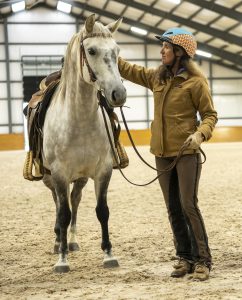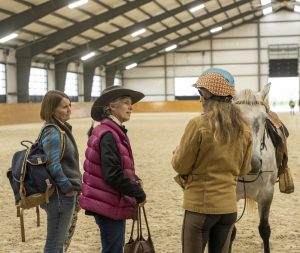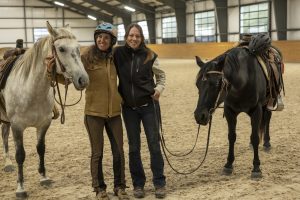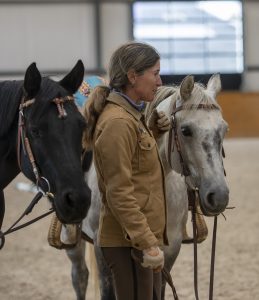
Katrin at the BHPS 2021 Summit
Editor’s Note: Best Horse Practices Summit presenter Katrin Silva grew up riding dressage in Germany before moving to the United States at age 19 to learn to ride Western. She’s been riding both disciplines for the last 20 years and is a regular guest columnist for Cayuse Communications. The author of Dressage for All of Us: How to Help Any Horse Become a Happier, More Responsive Riding Partner lives in New Mexico where she works with dressage and Western clients.
Katrin’s upcoming book is Feel for All of Us, due in early 2022. Read more about that here.
Katrin writes:
Friends and clients are surprised to find out that none of the horses I work with are mine. I’ve been a horse professional for over 30 years, but I’ve spent most of that time without a horse of my own, for a few good reasons:
- I enjoy playing the role of teacher, coach, and relationship counselor for horses, so I don’t feel the need to become an owner, which, to me, is the equivalent of a parent – a role I never felt qualified for with human children, either.
- I enjoy working with a variety of horses, not just one, which has made the commitment to a horse of my own seem both unnecessary and daunting.
- I also worry that owning a horse would short-change my clients and their horses, because it would take time and energy away from them.
But the main reason I’ve always shied away from ownership is financial. I can’t support a horse the way a horse needs to be supported. I learned this the hard way, many years ago, when I went into business on my own in my mid-twenties. With the first couple of thousand dollars I earned, I purchased a young Appaloosa gelding to train and then re-sell. I soon realized that I could not afford to pay board, plus hoof care, veterinary care, and all the other expenses horse ownership brings, month after month. I also figured out that I did not have adequate time to spend with a horse of my own, because I needed to work extra hard, riding extra horses for clients, to pay for his upkeep and expenses. I re-homed the horse, at a loss, after less than a year, when it became clear that I would not be able to give him what he deserved in terms of care, time, and training. It was a tough lesson, but I’m grateful to have learned it early in my career.
People contact me all the time, offering to give me their horses – mostly their untrained, unsound, or otherwise unrideable horses they no longer want to keep. They assume that, because I don’t own a horse, they are doing me a favor:
- ”He’d be such a great project for you!” they tell me.
- “With you working with him every day, he could really reach his potential!”
This may be true. But my answer is no, every time. This is not because I’m short on compassion. It’s because I don’t want to own a horse I can’t keep for the rest of his life, no matter what. I would want to be able to support a horse like a family member – in sickness and in health, regardless of how useful he is to me or anyone else. I would want to give this horse a solid education. Though I would not buy a horse with the intention of re-selling him, I still might have to find him a new home if my life circumstances change, which is always possible. It is relatively easy to find a good, caring, long-term, knowledgeable new owner for a rideable horse that’s a safe to be around:
- who ties without pulling back
- who is easy to load, unload, saddle and bridle
- who will happily walk, trot, and canter with a rider on his back
- who will steer and stop.
- who will pick up both leads, stand quietly by a mounting block, negotiate hills, road crossings, and ground poles
- who is a pleasure to ride and a pleasure to have around the barn.

Katrin visits with attendees of the BHPS 2021
Such a horse has a good chance of finding a home with people who will appreciate him, even if he’s not a fancy show horse, even if he does not have papers, even if he’s older, even if he takes some extra care to stay sound. Yes, horse ownership is a long-term commitment, which is why I don’t take it lightly.
While I choose to be without a horse, I do long for a horse I can love as my own. Of course, I do. And, after all these years, I find myself considering owning a horse again. I am leasing a lovely mare from a long-term client, to test the waters: Can I afford the monthly expenses involved? Do I have extra time to work with this horse every day, or almost every day?
I wish more prospective horse owners would take this intermediate step before making the decision to buy a horse. I also wish there were more options available for riders who are not ready to own a horse. In Germany, riders without enough time or resources for a horse of their own can find horse-sharing arrangements. These kinds of situations would benefit many riders here, who see horse ownership as a black and white situation. Sadly, too many horse owners don’t consider the time, work, heartache, and money required over the course of a horse’s lifetime. Sadly, way too many horses spend most of their lives standing around without adequate exercise or education. Sadly, way too many horses get passed around without ever learning much until they end up neglected or abandoned.

Katrin and Amy Skinner presented at the BHPS in Lexington, KY
Think about the commitment you are making when you buy a horse.
- Can you afford a horse, not just in basic monthly expenses, but when he needs vet care or a chiropractor?
- Are you skilled enough to educate him? If you are, do you have enough time, every day, for months and years, not just a couple of weeks here and there?
- If you’re not, can you afford the added expense of a good trainer?
Please think about these things before you buy or adopt a horse. Think carefully about which horse to buy – ideally, one appropriate for your level of experience. Don’t “rescue” a horse you can’t keep or can’t handle. Above all else, remember that it is never okay to dump a horse. Please don’t. It’s not fair to anyone.

This is a thoughtful and thought provoking (I hope) article. I wish that we would all give more careful consideration to the big picture of bringing an animal into our lives. I’m a life long horse “owner”. It has been rare in my life that I didn’t have a horse in my family. I’m trying to be careful in the words I choose – I don’t own my horses, (or my cats), we are a family. And as a family we take care of each other. Katrin writes well of the responsibilities, expenses and challenges of having one’s own horse. I don’t have a dog anymore – why? Because I don’t have the resources to properly care for a dog – the time, the energy, the attention, the money. Lessons and leasing are a great way to enter into horsepersonship. I’ve always suggested to riding students that they investigate all the options & possibilities – go to various breed & discipline horse events, audit clinics, take a variety of lessons with different instructors and different horses. Less chance of buying a warmblood & then discovering that you really want to chase cows! There are 4 horses in my family. 3 of them are “on purpose” horses and one is the result of taking in a mare who wasn’t supposed to be pregnant! 2 are retired due to age or injury. All will live out their lives in this family and arrangements have been made in case I’m not around! Pretty much all of my resources go to these horses and sometimes I come up short. There is something I’d like to do for one of them that I can’t afford. There’s nothing wrong with selling & buying horses, even if a person does that for a living – as long as the best interests of the horse is ALWAYS priority #1. Unfortunately that is often not the case. I’m glad we are talking openly about these challenges – it will mean better lives for horses.
I absolutely love this — so true, all of it! When I bought my horse as an inexperienced adult rider 4 years ago, I had only a vague inkling of the lifetime commitment I was making. I have learned so much and, thankfully, have had the resources, good health, and sustained interest to step up to the plate and do right by my horse. This has included rehabbing from an injury he had as a career jumper prior to coming to us, to learning all about horse care, to finding the right boarding facility and a great team of professionals to keep him sound and healthy. Luckily also, I bought the perfect horse, who is a as good as gold and just right for both me and my daughter to learn with, and we have had great fun with him. I consider him my third child (having two human ones in addition). I’m not sure what the future will bring, but for now at least, I am supremely content being the owner of a single horse and am committed to keeping him sound and healthy and enjoying him into his golden years. That is enough for me.